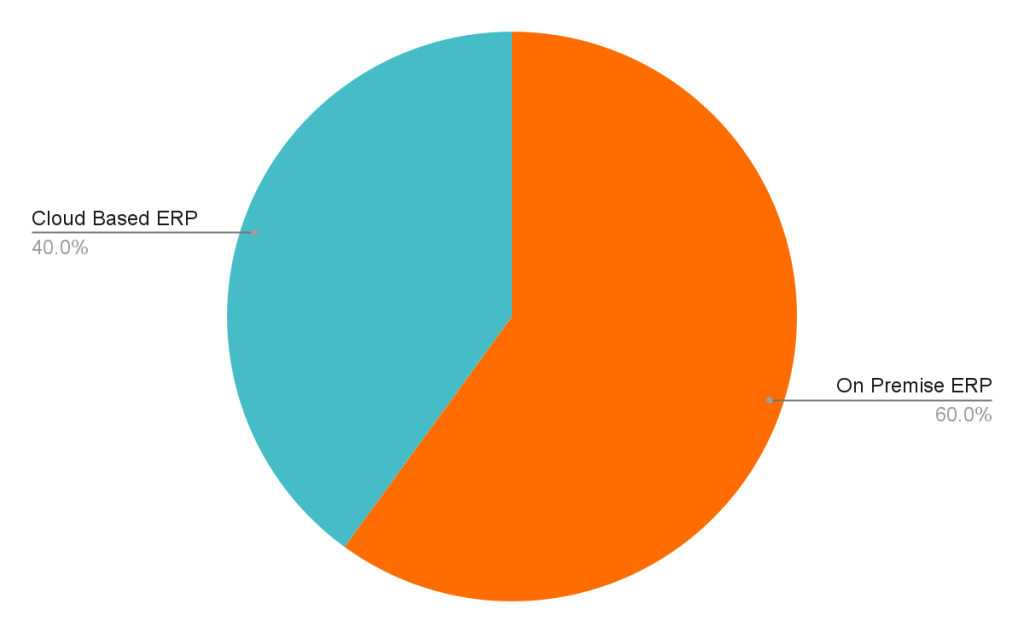Choosing the right ERP deployment model is one of the most important decisions a business can make when planning a digital transformation. It affects how your teams work, how much you invest upfront, how your data is stored, and how easily you can scale in the future.
Broadly, there are two main types of ERP systems: Cloud ERP and On-Premise ERP. While both offer similar core functionalities such as managing finance, operations, procurement, and HR, they differ significantly in how they’re deployed, maintained, and accessed.
This article breaks down the 10 most important differences between Cloud and On-Premise ERP so you can decide which approach better fits your business needs, resources, and goals.
What is Cloud ERP?
Cloud ERP is a modern enterprise system hosted on remote servers and accessed through the internet. Instead of installing the software on company-owned hardware, businesses subscribe to a service managed by a third-party provider. Access is typically available through a secure web browser or mobile application.
This model eliminates the need for on-site servers and internal IT maintenance. System updates, backups, and security management are handled by the vendor. Businesses pay a monthly or annual subscription fee based on usage.
Cloud ERP is increasingly adopted by companies that prioritize rapid deployment, flexibility, and access from multiple locations.
According to IDC, global spending on public cloud services is projected to reach $805 billion in 2024, doubling by 2028. This trend reflects growing demand for scalable, low-maintenance systems that can adapt to changing business models.[?]
What is On-Premise ERP?
On-Premise ERP refers to enterprise systems installed and operated on servers located within the organization’s facilities. The company is responsible for all technical aspects—setup, infrastructure, maintenance, updates, and data security.
This model usually involves higher upfront costs due to hardware, software licensing, and internal IT staffing. However, it offers full control over the system’s configuration, customization, and data environment.
On-Premise ERP remains common in industries where data sensitivity, complex integrations, or regulatory obligations require in-house hosting.
Gartner estimates that 60% of midsize enterprise workloads will remain on-premise through 2025 due to integration complexity and compliance concerns.[?]
10 Essential Differences Between Cloud ERP & On-Premise ERP: Comparison Chart
Pros and Cons of Cloud and On-Premise ERP
Every ERP deployment model comes with trade-offs. Cloud ERP and On-Premise ERP differ not only in how they’re delivered but also in how they impact cost structure, operational control, and long-term scalability.
Cloud ERP
Cloud ERP has become the go-to choice for businesses prioritizing speed, flexibility, and low upfront investment. It’s especially attractive to companies with distributed teams or evolving operational needs.
According to IT Jungle, over 70% of ERP-related IT spending in 2023 was allocated to cloud solutions.[?]
Pros:
-
Faster go-live cycles: Most cloud ERP systems can be up and running within months, reducing business disruption.
-
Hands-off maintenance: Vendors handle all backend responsibilities, freeing internal teams to focus on operations rather than system upkeep.
-
Remote-friendly by design: Ideal for companies operating across multiple sites or offering hybrid work models.
-
Flexible growth: Capacity and modules can be scaled up or down as your business evolves, with minimal planning or infrastructure changes.
Cons:
-
Recurring subscription costs: Over several years, total costs may exceed what an on-premise model would require.
-
Customization constraints: Multi-tenant SaaS models are optimized for standardization, which limits deep process tailoring.
-
Dependence on the internet: Any disruption in connectivity, even briefly, can halt access to core functions.
-
Less control over change schedules: Frequent updates benefit security and compliance, but some companies may prefer more control over when changes are introduced.
On-Premise ERP
On-Premise ERP appeals to organizations with complex workflows, industry-specific regulations, or significant in-house IT infrastructure. It offers stability and deep customization, key priorities for many large enterprises.
According to Gartner (via Quixy), 60% of midsize businesses are expected to retain a majority of their systems on-premise through 2025, often due to the complexity of existing integrations or regulatory demands.[?]
Pros:
-
End-to-end control: System behavior, data handling, and upgrade cycles are all under your company’s full authority.
-
High configurability: Capable of supporting unique business processes or integrating tightly with proprietary tools.
-
Stable internal access: No reliance on external internet connections for system uptime.
Cons:
-
Significant capital expenditure: Budgeting must account for infrastructure, licenses, skilled IT staff, and long-term support.
-
Slower to adapt: Implementation and change processes are longer and more resource-intensive, which can hinder responsiveness to business shifts.
-
Ongoing maintenance load: Your IT team must plan, execute, and manage all updates, security patches, and backups.
-
Scalability comes with effort: Expanding capacity requires additional hardware and planning, which may slow down business agility.
Choosing the Right ERP for Your Business
There is no single ERP model that fits every organization. The right choice depends on operational complexity, industry-specific needs, geographic spread, and IT readiness.
Some businesses benefit from the agility and low infrastructure burden of the cloud. Others require the security and control of an on-premise system, especially when managing sensitive data or legacy processes.
Key Factors to Consider When Selecting an ERP System
A successful ERP system is more than just software—it’s an operational backbone. Here are several key areas to evaluate when choosing a system:
-
Industry Relevance: Look for ERP solutions that support the specific workflows and reporting requirements of your industry. Generic systems often lack the depth needed for specialized sectors like construction, distribution, or services.
-
Compliance and Localization: In markets with complex tax regimes and regulatory reporting (such as the UAE and Saudi Arabia), the ERP system should support automated VAT handling, e-invoicing standards, and corporate tax reporting out of the box.
-
Deployment Flexibility: Some businesses require full data control; others need to prioritize accessibility across distributed teams. The ERP should give you the option to choose the hosting environment that best fits your operational model.
-
Scalability and Integration: As your business grows, the ERP should be able to scale with you, whether that means adding users, modules, or integrations with third-party tools.
-
Implementation and Support: ERP is a long-term commitment. The availability of local expertise, responsive support, and a clear implementation methodology can significantly reduce rollout risk and ensure smoother adoption.
Many ERP providers offer strengths in one or two of these areas. Few combine all of them in a single solution. That’s where FirstBit stands out—with a platform designed for project-based businesses, built-in compliance for GCC markets, flexible deployment options, and dedicated local teams that handle implementation directly.
Conclusion
Choosing between Cloud and On-Premise ERP means weighing control, cost, and flexibility, but it also means selecting the right system partner. Beyond technical features, the real value lies in how well the ERP fits your business needs today and adapts to them tomorrow.
Whether you prioritize regulatory compliance, industry-specific features, or scalable growth, your ERP should strengthen core processes and reduce complexity, not add to it. The best systems are those that operate reliably in the background, allowing your teams to focus on the work that matters.

Umme Aimon Shabbir
Editor at First Bit

See FirstBit ERP solutions in action
Discover how our system solves the unique challenges of contractors in a personalized demo.
After the demo you will get a quotation for your company.
After the demo you will get a quotation for your company.












